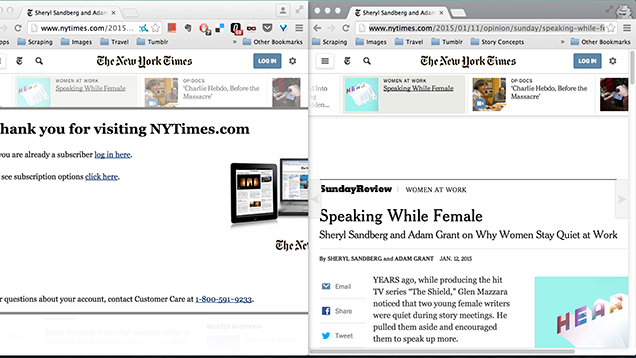
Do not go thinking that contents on internet magically appear online without any effort. People continuously work on articles, music and visuals that are then published for people to view online. Some dedicate much of their time and resource to create contents. These people make a living earning revenues with the use of internet. So, is it fair to make their materials freely available online?
Cost and earnings are generally a big factor for an online content producer. It may be in the interest of the producer to create a paywall for viewers as a form of ‘forceful appreciation’ for the efforts placed on that work created to cover the cost on taxes and publishing. But not many people are willing to pay a sum of money on something they are not able to quantify its usefulness. This conflict in interest, is a common cause for hackers or digitally savvy users to find ways to bypass and disregard any attempt in creating a paywall.
(Case against Open Access Journals.)
Open access allows free usage of material online, which means producers earn much lesser from the individuals that use their content. But, at the same time increases the possibility for rapid diffusion. Increasing viewer ratings, citation and positive reviews on websites signify higher credibility of the content, which producers can then leverage this to receive funds from organisations such as, ‘Coursera’, that dedicate themselves to academic research. ‘Free-riders themselves may learn to value the community more over time, so much that some of them may share eventually.’ (Dr. Jan. OER)

(Source: Herbert Lui)
However, most contents open to public are usually left uncredited and overly used or re-used to fortify another’s work which ends up diluting the original content. Victims of copyright cases are usually content producers not only from academic line but also encompasses those who make a living digitally such as, Graphic designers, music producers and many others. By allowing materials created to be free, it short-changes the efforts of these producers. Therefore, I still believe certain contents should be available easily whilst some protected.
It all sounds viable in enhancing research and how it will affect growth in medical and other fields in the world. But, we should also consider other resistance shared by Mark Hahnel on what impacts it has.
Curt Rice. 11 Feb 2013. https://www.theguardian.com/higher-education-network/blog/2013/feb/11/science-research-crisis-retraction-replicability
Curt Rice. 30 Sep 2014. http://curt-rice.com/2014/09/30/main-problem-open-access-best-way-fix-isnt-going-work/
Dr Jan Hylen. https://www.oecd.org/edu/ceri/37351085.pdf
Mark Hahnel. 30 Jun 2014. http://er.educause.edu/articles/2014/6/issues-in-open-access-to-research
Terry Lee. 12 Dec 2014. http://www.howdesign.com/design-business/business-issues/intellectual-property-copyright-issues/
Thorin Klosowski. 16 Sep 2013. http://lifehacker.com/use-google-as-a-proxy-server-to-bypass-paywalls-and-oth-799030304
Hi Mogan,
While I agree that allowing all originally produced content to be free does feel like efforts of these producers may be shortchanged, I don’t think that paywalls are necessarily a form of ‘forceful appreciation’ for their efforts.
It’s the same with any other kinds of purchase: if you see a shirt you like, you pay for it. If find a new song on Itunes which you like, you pay for it. – so how does this classify as forceful appreciation?
Paywalls in fact helps to filter out the ‘crooks’, who has intentions to copy-and-paste ideas and call it their own. People who truly are there for the knowledge and find it useful would be willing to pay for it. (1)
For content to be recognised (perspective of producers) and optimized (perspective of consumers) at the same time, perhaps success lies in pricing it correctly?
(1): https://www.nbr.co.nz/opinion/10-reasons-love-paywall
LikeLiked by 1 person
Hello mogan,
The issue of intellectual property for content producers is a huge issue. Especially with the ease of finding images online that anyone can save off the internet and then crop out the logo or watermark. As a designer myself I’ve faced this problem countless times. I agree with all the points that you’ve put out but in my personal opinion and experience I feel that most users are not aware of the intellectual property rights of some content. We can relate this back to Topic 2. I feel that if one is a digital visitor rather than a resident it might be possible that saving images and “recycling” others work isn’t a big issue. The internet in most cases is defined and advertised as a place where everyone is free to use and share content. Do you think action needs to be taken on someone who isn’t aware of intellectual property and what do you think are the steps creators can take to make people aware of these issues other than the what the video suggests?
Click to access 17_WISE2_IP_2001.pdf
This survey done can be of help in regards to awareness of it being a crime.
LikeLiked by 1 person
Hey Zai,
Yes i agree with you that many ‘visitors’ may be unaware or are simply negligent to the property rights and how it harms the content producers. I do feel that severe actions or punishments need not be taken to fight for intellectual property, but, i would believe that certain software can be developed or used (if such software exists) to stop users from dragging images out of the web page and right-clicking images. These are just small steps to create a barrier. However, we know it is still possible to simply screenshot an image and like you said remove any ‘Blemishes’ on the image. I solely believe that in order to see a change in the misuse of content, internet users should be educated on netiquette and ethical behaviours online. One such habit is that people need to understanding how simply quoting the author or creator of the content when using it, helps to credit them serving as a ‘advertisement’. There are several other ideas that can only work if the community are willing to pick up healthy habits.
LikeLiked by 1 person
Hi Mogan,
Thanks for sharing your interesting views on this topic. I do understand that it is unfair to the CP by having them to pay for the publishing fee themselves. However, I do think that it benefits both end-user like us as well as themselves. Although they were ask to pay the publishing fee, but looking from a marketer’s point of view, don’t you agree that the advantages for them to develop content online outweighs the downside of it?
Furthermore, to what you mentioned in the text that “certain contents should be available easily whilst some protected” is actually quite difficult to implement. By cross-referring to Maureen’s blog post on the same topic, she did mentioned about this as well, as she said that it was hard because there are no parameters to determine which article/journal should be released for free and which should not. Also, what do you think of students like us that might not have enough purchasing power to actually subscribe for contents that might be of “no use” to us?
Hope to receive your reply soon!
LikeLiked by 1 person